|


|
|
NEWS: December 2017 |
|
|
|
December 30, 2017 |
|
Oklahoma's Carpenter Square Theatre opens the New Year with "Ages
of the Moon", one of Sam's last plays. The comedy-drama about two old
friends plays January 12-27, 2018. All performances are at the theater, located
at 800 W. Main in downtown Oklahoma City. "Ages" continues some of the themes
that have been ever present in Sam's work, such as the troubled and comical
sides of family life, friendships, and experiences of love. Byron and Ames are
old friends reunited by mutual desperation. Ames has retreated to an old shack
to lick his wounds after his wife kicked him out of their house for some
adulterous indiscretion he can’t even recall. Over bourbon on ice, they reflect
and bicker until fifty years of love, friendship, and rivalry are put to the
test at the barrel of a gun.

Terry Veal directs with assistance from Michael Greene as
stage manager. Rob May and Michael Kramer co-star as Ames and Byron.
Reservations are highly recommended for the intimate 90-seat theater.
Visit www.carpentersquare.com for more information.
* * * * *
Counterpoint Press has announced that "Sam Shepard: A Life"
by John J. Winters will be published in paperback in March. It will include an
epilogue recounting Shepard's last days, the many tributes that poured in, and
more. Upon Sam's death last summer, John issued the following statement:
I was in Chicago when word reached me that Sam had passed.
Though I'd heard that his health had been failing for some time, the news
somehow surprised me. I never doubted that when it happened it would bring me
great sadness, which it did.
Sam will be remembered as an American original. He was an important American
writer, one of the greatest American playwrights of the past half century, and
as an actor he graced the screen with an authenticity that was always coupled
with a surprising vulnerability. To encounter his work in any medium meant never
forgetting it.
I hope my book will remind people why he mattered, and with any luck, will be
around to tell future generations about this talented and versatile artist. I
believe he will be well remembered for many generations, if not longer. As one
of the many saddened commentators following Sam's obituary in the Times put it:
"Punch a whole in the sky, Sam." I'll add only, God speed, and thank you for the
words and images.
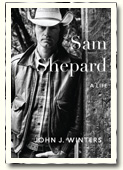
* * * * *
Dustin Illingworth, LA Times, book review:
"Spy of the First Person" is an eloquent, if necessarily brief,
valediction. At just 96 pages, its effect is one of atmosphere rather than
narrative, an aching requiem sung in the shadow of extinction. It is also partly
autobiographical. Like Shepard, the narrator is an old man dying of a
debilitating illness. His flickering consciousness ranges over great temporal
distance, blending present-day observations with fragments from a disintegrating
past.
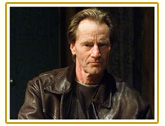
From the NY Times, 12/29/17 - Deaths in 2017:
Pillars of the theater fell: the directors Peter Hall, who towered on both
sides of the Atlantic, and Max Ferra, who championed the work of Latinos; the
British actors John Hurt, Roy Dotrice and Alec McCowen; and the playwrights A.
R. Gurney and Sam Shepard, though “playwright” alone does little justice
to the uncontainable Mr. Shepard’s manifold artistry, which branched as well
into movies, television, music and fiction.
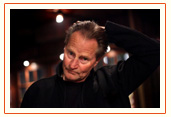
* * * * *
Mick LaSalle, SF Chronicle, 12/29/17 - 2017 in Review:
Sam Shepard: We had other notable movie deaths — Jerry Lewis, in
particular — but before Shepard became ill, he was at the top of his game. Thus,
at 73, he was a real loss to the art. He thought of himself mainly as a
playwright, but his acting was hardly a sideline. He had a philosophical quality
in his very being, a kind of courageous acceptance of the truth, and an honesty
that called forth honesty in others. He was a convincing hero, and as a villain
he was terrifying, because he still maintained his familiar aura of moral
certitude. Nothing could dissuade him. Sam Shepard was a great actor.
When Sam died in July, LaSalle wrote the following: "'I
didn’t go out of my way to get into the movie stuff,' Sam Shepard once said. 'I
think of myself as a writer.' And in the end, it’s as a playwright that Shepard
will probably be most remembered. But then again, maybe not. Plays have to be
produced and rehearsed and presented to the public. But movies are everywhere,
and Shepard not only made a lot of them, but lots of very good ones spread out
over three decades. He distinguished himself in these films as a strong and
distinct screen presence."
* * * * *
Michael Cavna of The Washington Post wrote, "From
music to movies, we mourn pioneers and performance icons in 2017." As a memoriam
for a way to say "thanks", he posted this work from the Comic Riffs
sketchbook.
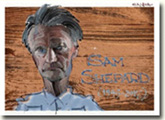
|
|
December 29, 2017 |
|
The New York Times Magazine featured an article on those who
had died this year. The photo below was labeled - "The writer Sam Shepard's hat,
at his son Walker's home in Louisville, Ky". The quote is from his other son
Jesse.
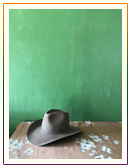
"He was always a pinch-front kind of guy, the style is kind
of a triangular crease in the front. It’s a strong reminder of the man — of him
being outside and on location and involved in the day. There is a practicality
and a confidence to it. It’s a well-worn hat. His work was key to his day and it
was always about process and project. I was a wrangler on Silent Tongue;
it was my first job. I briefly doubled my dad on Don’t Come Knocking
because the production wouldn’t let him run a horse hard because he might get
hurt as the star. It was the last location work I did with him."
* * * * *
In a recent podcast from Playback, director Scott Cooper
discusses his latest film Hostiles, but also talks about his relationship
with Sam having cast him in Out of the Furnace. After being given
the script, Sam called Scott from Paris and said, "Well, this seems like a
cousin to Buried Child". After filming, their friendship continued and
they stayed close. Sam described the two of them as "two peas in a pod". The
kindred spirits would often converse on horses, politics, literature and discuss
their individual projects. In a recent interview with GQ, Scott talks about his
younger days - "I was afflicted with a certain wanderlust. You know, wanting to
travel and this kind of idealism of a vagabond lifestyle. Which I never really
did lead. But it sounds great when you read Sam Shepard. One of my former pals
and mentors."
Scott then tugged on his denim jacket. "Sam gave me this coat," he said. "I had
commented to him on many occasions how much I liked it on the set because I did!
Sam was probably the most effortlessly cool person I've ever been around. And
his work spoke to me on a very deep level."

Scott Cooper wearing Sam's jacket *
* * * * Author Howard Norman has contributed his
remembrance of Sam at this link and
concludes, "To me his writing will, for a
long, long time, continue to dignify literature." |
|
|
|
December 24, 2017 |
|
Liz Nord, No Film School:
RIP: 17 Film Luminaries We Lost in 2017
These influential figures will be missed by the film industry and beyond. One
comfort we have as creators is that, after all the toil and trouble we go
through to put our work out into the world, that work has the potential to
outlive us and continue to move people long after we are gone. That can
certainly be said of the people on this list. From genre-defining directors to
DPs who made us see the world in new ways, here is one of the names that we hold
close to our hearts from those who left us in 2017.
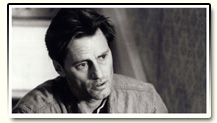
Sam Shepard is the type of artist who will be remembered across every discipline
of culture. While the plays he wrote (44 in total, three of which won Pulitzer
Prizes) are some of the greatest contributions to American theater, the themes
that sprouted from his mind have gone on to inspire generations of filmmakers,
actors, and writers to delve into the darker side of family life, friendships,
and experiences of love. He was also a well-respected actor, garnering an Oscar
nomination for his role as Chuck Yeager in The Right Stuff (1983).
* * * * *
Here's a page from a PDF of the Midway Messenger:
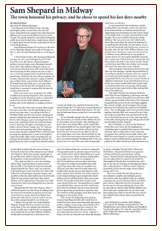 |
|
|
|
December 17, 2017 |
|
Sam's pal Johnny Dark has been silent since his
friend's death and many of us wondered what his thoughts were, especially since
the film "Shepard & Dark" had revealed their relationship ending on a rather
sour note at that time. Today UK's Guardian posted Johnny's remembrance of Sam,
and typically he exposes some raw edges in their 54-year friendship. I like
Johnny because he doesn't believe in bullshit.
We first met in 1963 in New York’s Lower East Side when it
was a neighborhood of actors and theatres and artists. He was introduced to my
wife, who had two daughters, and he married the eldest [the actress O-Lan
Jones]. We hit it off right away: I liked him very much. He was 24 years old and
in the early stages of writing plays, and he was getting some recognition. He
was very unpretentious and friendly, and he was always like that, up until the
end.
Then my wife and I left New York, and when Sam and O-Lan came to California to
visit us, we all decided to live together as an extended family. We took a
series of houses and lived together for about 15 years with Sam, his wife and
son, O-lan's younger sister and my wife. We were in our late 20s, early 30s; he
was three years younger than me. It was unusual to have another male in the
house – my son-in-law – who was also a best friend. For their little boy Jesse,
it was an unusual set-up to grow up in, but he only realized that years later
when he met his wife’s family, which was much more conventional.
Sam and I got up to a lot of mischief. He was starting to write some of his
best-known plays at the Magic Theatre in San Francisco, so we had a lot of
opening night adventures. We had motorcycles and we raced around, we travelled.
I was a writer and he was a writer, and we both loved movies. He was an
alcoholic and I was a drug addict. And we had an inflated sense of how wonderful
we were.

It was during this time that he was first approached to be in
a movie. Bob Dylan called to ask him to go on the road with the Rolling Thunder
Revue to do some writing for a movie they were making. And on the basis of that,
the director Terry Malick called and asked him if he would like to be in "Days
of Heaven", with Richard Gere, an unknown at the time. That was his first
experience in the movies, and from there he had a dual career as a playwright
and a movie actor.
But what happened is he ran off with Jessica, which was a big upheaval. One day
he just didn’t come home. Everyone was surprised except me. They started a life
together, and eventually had two children. We started to write letters to each
other because he lived in various places, Virginia, Minnesota and New Mexico. We
were both big letter writers: we’d write about women, drugs, various stories.
And we’d talk a lot about literature: his main man was Samuel Beckett, mine was
Jack Kerouac. He read a lot of plays too – Shakespeare and Oscar Wilde.
We were friends in our 20s, 30s, part of our 40s, and then he fell under
Jessica’s influence to a certain extent. He started going through a change
there. And you have to factor in the tremendous effect that becoming famous
through movies has on a person. It’s a terrible influence. Wherever you go, the
whole world is giving you special treatment, and that’s a very damaging thing
for the ego.
I was never particularly interested in his plays: they were filled with humor,
but also with violence and chaos, so it always amazed me that people were
attracted to him based on his plays. He drew another audience through his
movies, and that was outstanding. He was a very handsome, popular young man. It
was a form of mass hypnosis. He played Chuck Yeager in "The Right Stuff", the
man who broke the sound barrier, and people thought Sam broke the sound barrier.
One of the things we had in common was that we were very private people. We were
both loners, and when we got older, it became more intense. He had a very
difficult time with relationships. He left his first wife, he ended up leaving
Jessica and the kids, and living alone on his ranch in Kentucky. His love before
anything else was writing. He was really a lost soul, looking for something
impossible. He couldn’t maintain relationships at all. Even when he was with
Jessica, he bought a place that was far away so he could run off from it all.
Ever since I met him, he was running away. And he described himself like that to
me. Restless. Discontented. Lost. Those things don’t matter that much when
you’re young, but when you’re older, they become more and more difficult.
When Sam came to visit me in Deming, a little town near the Mexican border, he’d
check into a motel and call to tell me he was in town, and we’d meet every day
in a local road-side restaurant. We’d sit for hours, talking and reminiscing.
Until the end, when he started getting sick: he had ALS and emphysema. He even
had trouble lifting his cup to his mouth at that point. So mostly what we talked
about was his illness. He was driving around the country seeing if he could find
some kind of cure for it.
That was difficult. He knew he was dying. There’s no cure for either disease:
they get progressively worse. From what I could see he was getting more
depressed, more angry, going through all the stages people go through when
they’re dying. He had been busted for the second time driving drunk. All of
these things were happening at once for him. His life was falling apart.
The last time he came through here he was having a lot of trouble driving. He
shouldn’t have been driving at all. He was losing control of his whole upper
body, having trouble controlling the truck. He was driving to his farm in
Kentucky, travelling with a large oxygen machine because of his difficulty
breathing. The morning he left I had to load the machine on the truck and all of
his medicines, and he just got into the truck and drove off. I took a load of
pictures of him that morning and they may be the last photos ever taken of him.
So it goes from the light in the 60s, and youth, to the dark at the end. He had
a great need to be adored and applauded. I have some of that too. We were very
similar in a lot of ways, but we had very different styles in the way we dealt
with each other and other people. He was a big influence on me, in a good way
and a bad way. He was a big part of my life. |
|
|
|
December 11, 2017 |
|
Patti's tribute to Sam last Tuesday in celebration of his book release was
written up at this
Vogue link. It's a great overview of the evening by Rebecca Bengal. In
the following, she describes Patti: "Taking a seat on the edge of the
stage as her longtime collaborators Lenny Kaye and Tony Shanahan played a
rendition of the folk ballad 'Bury Me Not on the Lone Prairie' —a cowboy lament
for the man with the cowboy mouth—she rocked to its loping rhythm and seemed
briefly overcome. Then she caught herself, flashed a warm smile to Shepard’s
three grown children, Hannah, Jesse, and Walker, seated in the second row." And
later in the evening, Patti tells her audience, " We were friends for more than
half a century." The photo below is one of my favorites:

A few more reviews of "Spy of the First
Person" have surfaced this past week. Sam Sacks of The Wall Street
Journal quotes the old man in the story - "The thing I remember most is being
more or less helpless and the strength of my sons." Sacks writes, "At last he
has no choice but to accept the company of others as he travels through the wide
American somewhere." Yes, the lone cowboy needs someone to scratch his itch or
wipe his ass. Biographer John J. Winters, who wrote "Sam Shepard: A Life",
refers to Sam as the "wounded cowboy" who retires to his Kentucky home to await
death. In
his review, Winters writes, "When the doctor tells him there’s a
problem, his response is pure Shepard: 'I know something is wrong. Why do you
think I’m in here? He just looked at me with a blank stare.'" Reading that, I
can feel an icy wind sweeping over my face and it feels prickly...
And Winters goes on to point out an observation that no one
else thus far has mentioned. He writes, "Shepard’s last written reflection is,
appropriately enough, about fatherhood, something he’d dealt with in life, on
pages and stages, for more than a half century. However, notably missing from
'Spy of the First Person' is any mention of his own father."
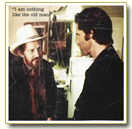
How true, but what about the glaring absence of a certain
woman who was the love of his life for almost 30 years? She's missing from the
pages of this "fictional memoir" and her presence is missing from his final
weeks on his deathbed, but at least brave Patti Smith/Mighty Mouse arrived to
save the day. As you can witness in the documentary, "Shepard
& Dark", perhaps Sam never had the courage to address those painful
issues that were too close to his heart, not even at the end of his life. |
|
|
|
December 6, 2017 |
|
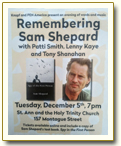
Last night Patti Smith performed at a tribute concert
for Sam in celebration of the release of his book. The event took place at St.
Ann & the Holy Trinity Church in Brooklyn. During a performance of "Dancing
Barefoot", Patti forgot one of the lyrics and began laughing. "What is it? I've
sung this nine million times," she said. "You know what, Sam really liked when I
did this. He would actually taunt me and be somewhere and get my attention so I
would mess something up. And he had this coyote laugh, I can't explain it. So
I'm sure he's enjoying this right now."
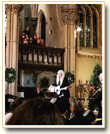 |
|
|
|
December 5, 2017 |
|
Guess how I spent this afternoon? Yes, reading "Spy of the
First Person". We'll call my thoughts "Musings by Coymoon". Let me preface this
by saying except for "The One Inside", I have thoroughly enjoyed the stories of
Sam Shepard, and even more so when they were narrated by him, such as his
audiobook, "Cruising Paradise". In this last volume of his work, I find a man
completely absorbed in the physical deterioration of his body without any
reflection on life and death.
These stories, often fragments, equate to nothing more than
dream sequences that we all experience. As Jocelyn McClurg (USA Today) points
out, "The reader must follow the flow; but, like trying to decipher someone's
dreams, it's not always easy." Shall we call in Dr. Freud? Except for the last
two chapters of this sparse book, there's nothing significant or meaningful and
what you'll find mostly on these pages are the ramblings of any old man obsessed
with the restrictions that his illness has brought upon him. Nothing more.
However, I believe I did recognize his friend Johnny Dark and wife Scarlett [Olan's
mother].
Wouldn't "love" be a word that would frame your remembrances
of someone? Wouldn't "death" be a word that could be better defined as you
"stand on the edge of life and see the Darkness"? [The Seventh Seal]
I am a stickler for writing reviews for books, film [Roger Ebert being the
worst!] or theater without giving away the plot or without including way too
many quotes. If you go read through the many reviews, you probably have already
read this book! Truly! * * * * * I always
wanted to take this photo
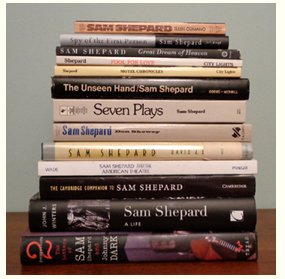 |
|
|
|
December 4, 2017 |
|
Tomorrow "Spy of the First Person"
will be released and I expect my edition to arrive shortly thereafter.
Presently, the
EW web site is featuring actor Michael Shannon reading
an excerpt from the audiobook. Shannon appeared with Sam in "Mud" and
"Midnight Special." In addition, the actor performed in several of Sam's plays.
This year alone, he participated in a June reading of "Curse of the Starving
Class" and acted in a five-week run of "Simpatico" at the McCarter Theatre
Center in Princeton, New Jersey.
When "The One Inside" was published, I indicated my dislike
of its cover with a photograph by Mexican photographer Graciela Iturbide. Dark
and depressing. Here again is another of her images called "El señor de los
pájaros en Nayarit (1984). Tibetans believe vultures are angel-like figures that
will take the souls to heaven, but in the bible, when blessings and curses are
given to Israel, God warns them, "Your carcasses shall be food for all the birds
of the air and the beasts of the earth, and no one shall frighten them away".
Under this curse, the gathering of the vultures symbolizes the height of defeat,
disgrace, and personal insignificance, when no defenders are left to keep the
scavengers from tearing a human body apart just as they would a dead animal.
What is Sam trying to say?
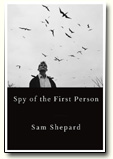
In an inversion of a typical dedication page, where the
author often thanks his or her family, "Spy of the First Person" is dedicated to
the author himself: "Sam’s children, Hannah, Walker and Jesse would like to
recognize their father’s life and work and the tremendous effort he made to
complete his final book."
And obviously it was a struggle for our writer to finish his
last work. When using his typewriter became too difficult, he wrote out his
notes with pen, and when that became impossible, he used a tape recorder.
In the end he simply dictated his words to his daughter Hannah or his sisters
Roxanne and Sandy.
Knopf editor LuAnn Walther says, "People think of Sam Shepard
as the solitary cowboy of American myth riding off into the distance, but in
truth, he was dedicated to his family his whole life." I beg to differ. Does
this include his parents? All his children? Have you ever seen a photo of
Sam with his sisters? She continues, "He was adamant that he didn't want the
book to be categorized as a novel even though he was told it could create
marketing problems. He said, 'why does anybody need a label.' You have to
remember that Sam was always adamant through the years that he would never write
a memoir. But what about a memoir of his dying?
Hannah says, "The line between fact and fiction in his own
work was always very ambiguous to Sam, I believe. Many things blended together
for him." Note that she refers to her father by his first name. And again when
she states, "Sam was suspicious of technology, and the failure of these devices
and computer programs just confirmed his lack of faith in them, I think.
Recording was a very different experience for him than the physical act of
writing, and he found it somewhat disorienting, but adjusted."
He made the final edits just a week before his death,
dictating small changes to his daughter as she read the manuscript to him, start
to finish. "Some of the funniest lines in the book, in my opinion, he added in
our last edit," Hannah says. She chooses not to point out which lines. "I would
rather keep this personal, as a memory between me and my father."
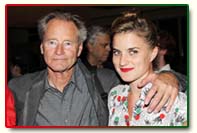
In a March 2010 interview with The Guardian, Sam opened
up a bit about his only daughter. He revealed, "I never thought about having
a daughter and then I had a daughter and it was a remarkable thing. It was
very different from having a son and your response to it. With a son, it's
much more complex. And it's probably because of my stuff in the past. With a
daughter, I was surprised at how simple it is." It's to her, he says, that
he intends to leave his notebooks, "because she's the one who's asked for
them."
|
|
|
|
December 2, 2017 |
|
In 1998 PBS' Great Performances presented a television
special by Oren Jacoby called "Stalking Himself". The documentary
emphasized Shepard’s identity as an "odd, contradictory presence on the American
cultural scene."
"He’s well-known but unknown, handsome and seductive but willfully remote," Will
Joyer wrote in a New York Times review of the film. "He’s almost too easily the
archetype of the authentic American, at home in the wide open spaces but not
really at home anywhere."
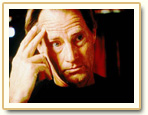
In the documentary, Shepard also said he was uneasy about
being too easily pinned down as a character he’d played on TV.
"I think we’re faced with a dilemma now that’s terrifying. You can just get rid
of you altogether and make you an image," he said. "In fact, we prefer the image
to the human being. We’d rather watch you on television than talk to you."
I think that's a very interesting observation and certainly
applies to him.
After Sam died, filmmaker Oren Jacoby spoke about the difficulty in making this
documentary:
"It was my first time working with Bob Richman, already
highly regarded as a cinéma vérité cameraman. Still, it was a shock when we
started shooting a rehearsal on our first day and Bob kept filming our main
character (Sam) from behind or the side, always at a distance, and mostly
pointing his lens at the other people in the scene. After a few minutes of this,
I started first to whisper and then physically to try and nudge him around to
the front, so we could at least see both eyes of the man our film was about.
'Trust me,' Bob said, 'he doesn’t want me there.' It was as if he had some
special cameraman radar and was picking up a vibe that there was this invisible
line that should not be crossed. (Bob told me recently that Shepard was the
hardest and 'most private' subject he’s ever dealt with in all his years
shooting documentaries.)
"But we respected that line and slowly, over the months that followed, we gained
Shepard’s trust (or at least resigned acceptance – or maybe he just forgot we
were there!) and Bob was able to move around and film him from the front. Then,
one day, after repeatedly putting off our request for a one-on-one on-camera
interview, Shepard turned to me and said something like, 'OK, let’s go do this.'
We found a corner near a window so we wouldn’t have to take time to put up
lights or spoil the mood and filmed an almost two-hour conversation. Shepard
went into a deeply personal exploration of his life and career, something he
never did again on camera, and something that would never have happened if Bob
had barged in front of him on our first day.
When Jacoby was asked what memory stands out for him today,
he replied:
"I remember a moment when we were filming him doing a series of plays in
New York and he was collaborating with different directors and one of them was
Joe Chaikin, who had been somebody that he really admired and learned a lot from
in his early days as a playwright. Joe Chaikin had recently suffered a stroke
and had aphasia and didn't have the same language that he'd had as a younger man
when they'd worked together. And to see how Sam was very protective of Chaikin
and kind of loved and respected him and wanted to, you know, help him still be
able to work, even though he'd been through this illness — it was just a very
tender moment watching them working together."
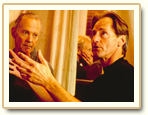
"And another great moment I remember with Sam is we were in a
rehearsal room and there was an upright piano in a corner, and in a break in the
rehearsal, he went over and started pounding out this amazing kind of jazz blues
on the piano, Albert Ammons or one of these 1920s Harlem piano players." |
|
|
|
|
|
|
|